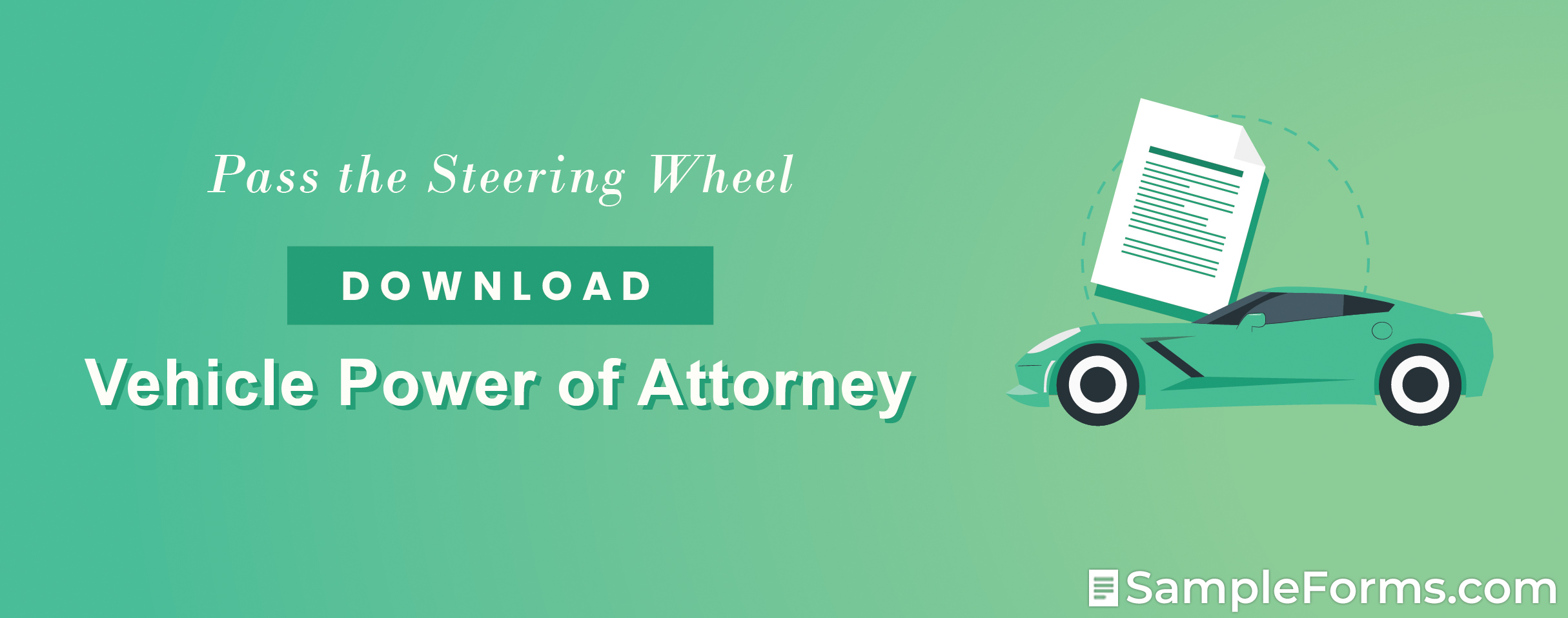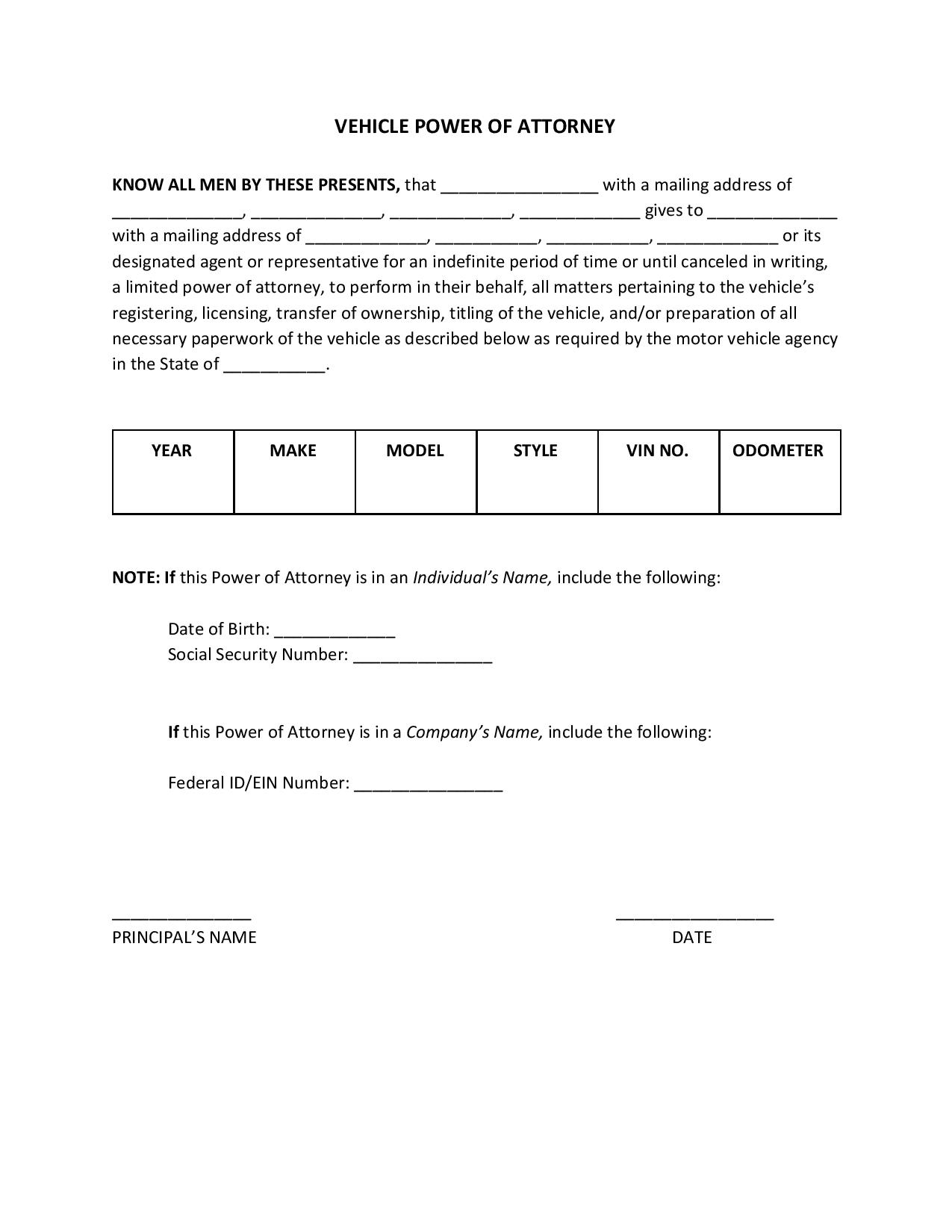- Eviction Notice Forms
- Power of Attorney Forms Forms
- Bill of Sale (Purchase Agreement) Forms
- Lease Agreement Forms
- Rental Application Forms
- Living Will Forms Forms
- Recommendation Letters Forms
- Resignation Letters Forms
- Release of Liability Agreement Forms
- Promissory Note Forms
- LLC Operating Agreement Forms
- Deed of Sale Forms
- Consent Form Forms
- Support Affidavit Forms
- Paternity Affidavit Forms
- Marital Affidavit Forms
- Financial Affidavit Forms
- Residential Affidavit Forms
- Affidavit of Identity Forms
- Affidavit of Title Forms
- Employment Affidavit Forms
- Affidavit of Loss Forms
- Gift Affidavit Forms
- Small Estate Affidavit Forms
- Service Affidavit Forms
- Heirship Affidavit Forms
- Survivorship Affidavit Forms
- Desistance Affidavit Forms
- Discrepancy Affidavit Forms
- Guardianship Affidavit Forms
- Undertaking Affidavit Forms
- General Affidavit Forms
- Affidavit of Death Forms
Vehicle Power of Attorney
All types of vehicles need proper and legal documentation to roam around the city. Police officers are lurking in every corner, awaiting an unsuspecting driver who lacks certain documents. You don’t want to be that unfortunate driver, do you? If you can’t process the paperwork yourself, then you have to appoint someone you trust to take your place and stead. And with that, a vehicle power of attorney form might be the perfect document for you. This document will legally authorize someone on your behalf. Read below to know more about this form. Read More
Vehicle Power of Attorney
What Is a Vehicle Power of Attorney?
A vehicle power of attorney is a document used to legally authorize the agent to perform actions related to the vehicle, such as the registering, licensing, transfer of ownership, titling of the vehicle, and selling the car. It consists of the agreement between the principal and the agent, the vehicle’s description, and the notary acknowledgment.
According to Statista, in 2018, the United States has around 17.2 million new light-vehicle registrations—making it the world’s largest automobile market—next to China.
How to Create a Vehicle Power of Attorney?
You have a choice of whether to download the form or make it from scratch. If you enjoy creating it from scratch, follow the tips below to help you create a vehicle power of attorney:
1. Identify the Principal and the Agent
Start off by identifying the principal and the agent with their mailing addresses. Use full names, and use official documents to act as your basis. Your agent can either be a person or a company—this should be someone you deem as trustworthy. The closing sentence of this paragraph should consist of the state in which this form is being governed.
2. Collect the Vehicle’s Description or Information
The vehicle’s description is used to verify both the owner and the vehicle itself. Include the year, make, model, style, VIN, and the odometer. Your POA should be accompanied by license plates, registration, certificate of title, proof of insurance, and other relevant documents that your local motor vehicle officer requires.
3. Delegate Powers
Be concise about the powers and the limitations of your powers when delegating powers. For example, if you are authorizing your agent to only sell the vehicle, state it clearly. The agent should be aware of their responsibilities and limitations. A generic statement of powers may have your agent performing more than what is necessary. For example, you have authorized your agent to handle all your assets while you are away—chances are, he might be selling some of the equipment that you did not want to be sold.
4. Identify the Vehicle’s Owner and Sign the Document
The owner of the vehicle can either be an individual or a company. If the vehicle is owned by an individual, stipulate the date of birth and the social security number. And if the vehicle is owned by a company, stipulate the Federal ID/Employer Identification Number (EIN). The principal may sign the document after with the date signed in the presence of the notary public.
5. Have the Form Notarized
Not all states require a form to be notarized but it is highly recommended because notarized power of attorney forms are seen as more reliable for some institutions. Sign the document in the presence of the notary which the notary will sign and affix their stamp. Keep extra copies of the document for personal records.
Before signing the document, always double-check it for errors, especially the names of both parties. Go over the document one more time and prepare the necessary papers needed to accompany the completed power of attorney form.
Frequently Asked Questions
Where should I get a power of attorney for my vehicle?
A power of attorney can be created from scratch or be downloaded online. But fillable templates are more advisable because they save so much of your time. All you need to do is gather all the essential information that you need for your power of attorney and use these when you fill out the form. Also, these templates are made to fit your State’s laws.
What can a power of attorney do?
According to Fair Share Lawyers, a power of attorney legally authorizes someone to perform tasks on your behalf—it does not remove your right to act or perform. An agent performs under a set of limitations you have set to ensure that the task is done correctly.
Can I revoke a power of attorney?
Yes. The power of attorney can be revoked by filing a revocation of the power of attorney. You must complete the said form, including your full name, signature, and the date signed.
Can a buyer sue for selling them a bad vehicle?
Yes, the buyer may sue you for selling them a bad vehicle but, since the power of attorney dictates that they have bought the car “as is”, their complaint won’t hold up in the court of law. Them signing the document would mean that they accept the condition of the car at the time of the purchase or after the purchase.
Should I pay my agent fees?
According to AARP, you can pay your agent reasonable fees according to what is stated in the power of attorney or according to the state law. If you appoint a family member as an agent, you may possibly pay a lesser amount.
Vehicles are extremely important in our day-to-day lives—they alleviate the stress that comes with the ordeal of commuting. And without the right papers, a car cannot just be paraded around the city. A vehicle power of attorney is appropriate for when you need someone to run your vehicle errands because of your other obligations. Use this form to legally authorize a person or a company to handle vehicle-related errands such as registering, licensing, transfer of ownership, titling of the vehicle, and/or selling the vehicle. With this form, you’ll never have to worry about your vehicle landing in the wrong hands because they are legally bound to this document.

